From The City Club of Cleveland 9.20.22
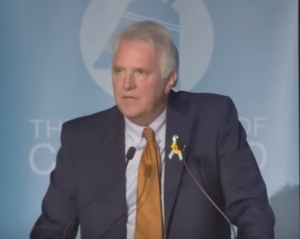
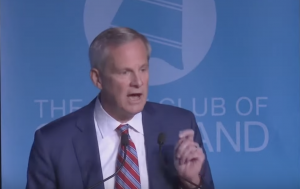
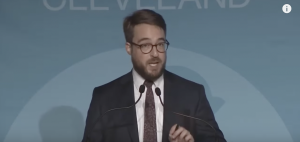
Watch The City Club of Cleveland debate between the two candidates for Cuyahoga County Executive: Chris Ronayne and Lee Weingart.
www.teachingcleveland.org



A bumpy road to regionalism
by Jay Miller, Crain’s Cleveland Business 9/19/22
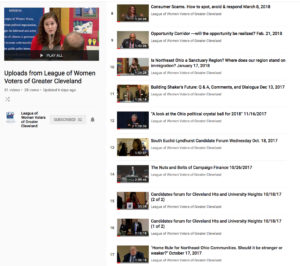
Links to all the LWV and partners issue forum videos 2016-2019
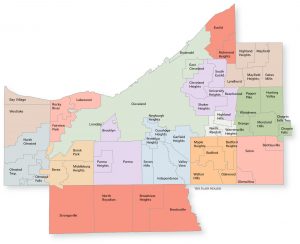
Proposed Revised Cuyahoga County Map 2012 (NEOMG)
Regionalism in Northeast Ohio-Material on the Subject from the Past 10+ Years
History of Cuyahoga County Government
From the Encyclopedia of Cleveland History (1810-2011)
History of Northeast Ohio Regional Government
From the Encyclopedia of Cleveland History (thru 2009)
Reports from the Plain Dealer
A Region Divided – Plain Dealer Report (2004) (currently unavailable)
A Region Uniting – Plain Dealer Report (2007) (currently unavailable)
Cleveland.com brought back some links in the above series here
Articles
A New Cleveland Without Borders Plain Dealer/NEOMG January 25, 2004
What’s Stalling Regionalism is Rampant Self-Interest on All Parts Cleveland Scene May 26, 2004
You Can Run, But You Can’t Hide Cleveland Magazine September 2007
County Government Reform is Likely to Happen in Stages Plain Dealer/NEOMG November 9, 2009
Cuyahoga County Pushes Regional Health Plans Plain Dealer/NEOMG March 30, 2010
Threats to Town Halls Stir Voter Backlash Wall Street Journal June 8, 2011
Cuyahoga County Offers Services in Pursuit of Regionalism Plain Dealer/NEOMG June 2, 2012
Cleveland Suburbs Let Regionalism Enter Through the “Back Door” Plain Dealer/NEOMG October 9, 2013
Four East Side Suburbs in Cuyahoga County to Study Merger Plain Dealer/NEOMG June 22, 2011
Merger For East Side Suburbs Off the Table For Now Plain Dealer/NEOMG July 17, 2013
Promoting Regionalism. Can Communities Save Through Collaboration? Cleveland.com 8/18/16
5 problems facing Cuyahoga County and how regionalism can address them Cleveland.com 11/15/2016
Cuyahoga County’s high taxes prompt discussion about consolidation Cleveland.com 4.22.19
What might be different today if Cleveland and Cuyahoga County had merged decades ago? 7.12.19
Opinion
The Ripening of Regionalism: Editorial Plain Dealer/NEOMG April 29, 2007 (currently unavailable)
Chris Ronayne Calls For Metro Government Cleveland Magazine April 2009
A Tale of 273 Cities: Jason Segedy April 14, 2014
Video
“Regionalism and Shaker Heights” Aug 18, 2016 Issues facing almost all of Northeast Ohio’s suburbs
Policy Report
Northeast Ohio Regional Economic Revenue Study February 2008 (website)
Report of the Commission on Cuyahoga County Government Reform November, 2008
Doctoral Dissertation
Policy Proposal on Regionalism From County Executive Ed FitzGerald
Policy Proposal from Edward FitzGerald: Director of Regional Collaboration (2010)
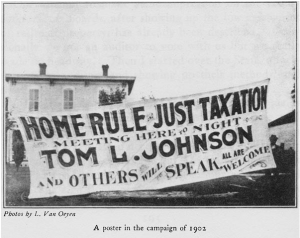
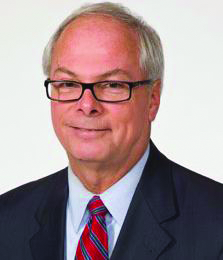

The Moral Implications of Regional Sprawl by Bishop Anthony Pilla 1996
October 29, 1950 column by Philip Porter, Plain Dealer endorsing County Charter reform
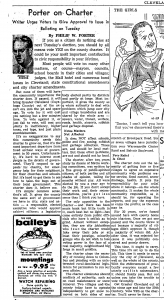
Plain Dealer columnist Philip W. Porter endorses 1959 Cuyahoga County Charter reform. The creation of an elected official and body of representatives that would assume many of the responsibilities of the local cities and townships.
It lost in November 1959…both Cleveland and many suburbs voted against it.
Question: What exactly does “home rule” mean for Ohio’s municipalities?
Answer: “Home rule” power is special authority granted to municipalities (such as cities and villages) through Article XVIII of Ohio’s Constitution. It allows municipalities to create laws and take action for which the Ohio Revised Code does not specifically give authority. Home rule essentially gives municipalities more power and flexibility.
There are three distinct home rule powers: the power of local self-government, exercise of police powers and ownership and operation of public utilities. The power of local self-government allows municipalities to regulate matters solely related to the governance and administration of their internal affairs.
This includes the form of government, internal organization, the control and use of certain public property, the procedure for the sale of municipal property, regulation of municipal streets, and the salaries of municipal officers and employees.
Home rule also gives municipalities policing power, which includes the authority to make regulations for the municipality’s general welfare, including its public health, safety and morals. Examples include zoning, animal control and traffic regulations. To take full advantage of home rule authority, a city or village will adopt a charter.
Q: What is a charter?
A: A municipal charter is a document that outlines how a city or village is run and how the power is divided. Any municipality may frame and adopt or amend a charter for its government. The charter is sometimes described as the constitution for a city or village and must be passed by the voters in the municipality.
A municipality does not need a charter to have home rule authority, but charters allow municipalities to gain additional freedom from the state legislature to handle local affairs as much as possible under the home rule provision.
Non-charter municipalities are more limited in their use of home rule authority because they must follow one of four statutory forms of government, while municipalities with charters can deviate from Ohio law both substantively and procedurally. Also, courts show greater deference to the home rule authority of a charter municipality.
Q: When does a municipality’s use of home rule go too far?
A: There are some limits on when a municipality can use its police powers to adopt an ordinance that conflicts with state law. If the state law is considered a “general” law, then state statute takes precedence over a local ordinance. For example, if you are charged with reckless operation of a motor vehicle, it may be a first-degree misdemeanor at the local level with the possibility of a $1,000 fine and up to 180 days in prison.
In the state code, however, reckless operation is only a minor misdemeanor with no jail time and a fine of up to $150. So, if you are charged with a first-degree misdemeanor offense under a city code, and the same offense is only a minor misdemeanor under the state code, then you can request a plea bargain and agree to plead guilty under the state code section.
Typically, courts determine a law to be “general” when it: (1) is part of a statewide and comprehensive legislative enactment; (2) applies to all parts of the state and operates uniformly throughout the state; (3) provides actual police, sanitary or similar regulations and standards rather than just broadly granting or limiting the legislative power of a municipality to create police, sanitary, or similar regulations; and (4) prescribes a rule of conduct on citizens generally. The Supreme Court of Ohio recently found local laws that tried to further regulate guns and oil and gas drilling beyond the statewide legislative enactments to be unconstitutional.
Q: Why does “home rule” matter to me as a resident of an Ohio city or village?
A: If you live in a chartered municipality with full home rule authority, your local government is more easily able to meet residents’ needs and reduce the amount of state legislative interference in local affairs. Home rule also gives municipalities more flexibility to determine the form and administrative organization of local government, and permits its residents to have a greater voice in determining local policies.
For example, home rule allows residents flexibility in how to elect city council members, and for the city’s administration to be led by an elected mayor or a hired manager/administrator. Home rule also allows municipalities to create their own zoning regulations, and permits flexibility for how mayors’ courts are run.
This “Law You Can Use” consumer legal information column was provided by the Ohio State Bar Association. It was prepared by Philip Hartmann, an attorney in the Columbus office of Frost Brown Todd LLC. Articles appearing in this column are intended to provide broad, general information about the law. It is not intended as legal advice. Before applying this information to a specific legal problem, readers are urged to seek advice from an attorney. Law You Can Use is published weekly in The Logan Daily News. The views of this column may not necessarily reflect that of the newspaper.
“Regionalism and Shaker Heights” forum Aug 18, 2016
“Regionalism and Shaker Heights” Aug 18, 2016
Issues facing almost all of Northeast Ohio’s suburbs
w/Panelists:
Armond Budish, Cuyahoga County Executive
Edward Kraus, Cuyahoga County Director of Regional Coordination
Earl M. Leiken, Mayor, City of Shaker Heights
Hunter Morrison, Director, NE Ohio Sustainable Communities
Consortium
Moderator:
Judy Rawson, Former Mayor, City of Shaker Heights
Thursday August 18, 2016 7-8:30 p.m.
Shaker Public Library, 16500 Van Aken Blvd, 44120
Cost: Free & Open to the Public
Cosponsored by
Shaker Public Library & League of Women Voters-Shaker Chapter